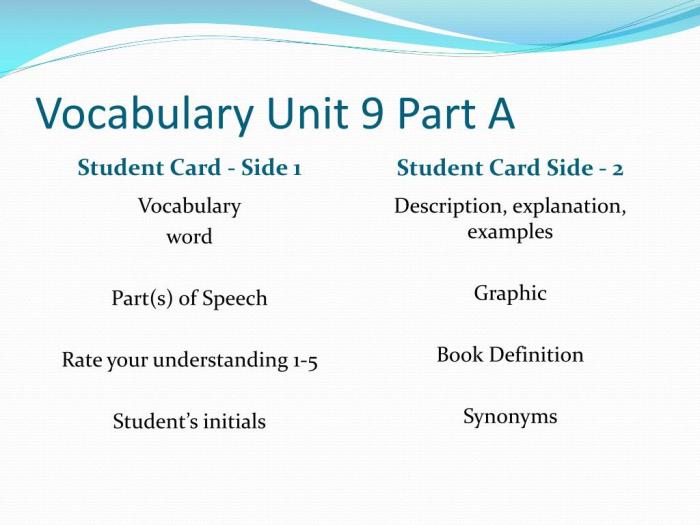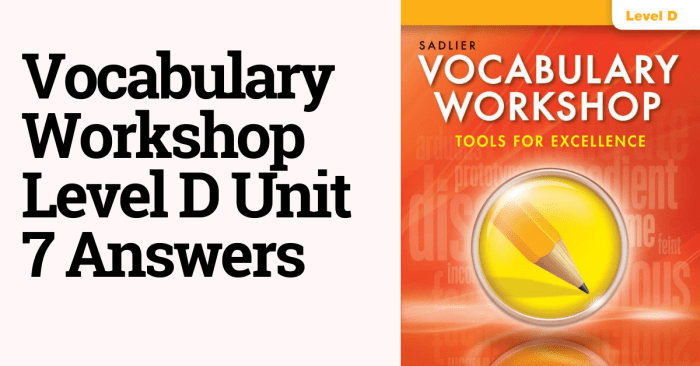Unit 8 Vocabulary Workshop Level D embarks on a linguistic journey, unraveling the intricacies of vocabulary building and its profound impact on comprehension. This comprehensive workshop delves into the heart of language, equipping learners with the tools to unlock the richness and depth of written and spoken communication.
Through a meticulous exploration of key vocabulary words, contextual understanding, word relationships, and word structure, this workshop empowers individuals to expand their vocabulary and enhance their ability to effectively convey ideas and engage with complex texts.
Vocabulary Analysis: Unit 8 Vocabulary Workshop Level D

Vocabulary building plays a crucial role in Unit 8, enabling students to comprehend the unit’s complex concepts and engage with the texts effectively. The unit incorporates a comprehensive list of key vocabulary words that are essential for understanding the unit’s theme and content.
The vocabulary words included in Unit 8 encompass a wide range of categories, including:
- Nouns:protagonist, antagonist, setting, plot, conflict
- Verbs:analyze, interpret, evaluate, synthesize, critique
- Adjectives:dynamic, static, foreshadowing, suspenseful, symbolic
- Adverbs:carefully, skillfully, thoughtfully, effectively, persuasively
These word categories are closely aligned with the unit’s focus on literary analysis, critical thinking, and textual interpretation.
Contextual Understanding
To enhance vocabulary retention and comprehension, it is essential to understand the words in context. The following table summarizes the vocabulary words and their usage in the unit:
| Word | Definition | Example Sentence |
|---|---|---|
| Protagonist | The main character of a story | The protagonist of the novel is a young woman who embarks on a journey of self-discovery. |
| Antagonist | The character who opposes the protagonist | The antagonist is a powerful sorcerer who threatens to destroy the kingdom. |
| Setting | The time and place where a story takes place | The setting of the story is a remote village in the mountains. |
| Plot | The sequence of events in a story | The plot revolves around the protagonist’s quest for revenge. |
| Conflict | A struggle between opposing forces | The conflict between the protagonist and the antagonist drives the story forward. |
By understanding the vocabulary words in context, students can better grasp their meanings and retain them for future use.
Word Relationships, Unit 8 vocabulary workshop level d
Exploring word relationships, such as synonyms, antonyms, and homonyms, deepens vocabulary comprehension. The following table organizes these words for easy reference:
| Category | Words |
|---|---|
| Synonyms |
|
| Antonyms |
|
| Homonyms |
|
Understanding these word relationships helps students build a more comprehensive and nuanced vocabulary.
Word Structure
Analyzing word structure, including root words, prefixes, and suffixes, aids in vocabulary expansion. The following table demonstrates this:
| Word | Root Word | Prefix | Suffix | Meaning |
|---|---|---|---|---|
| Analyze | lys (to loosen) | ana (back) | -ize (to make) | To break down into parts |
| Interpret | pretare (to translate) | inter (between) | -et (to make) | To explain the meaning of |
| Evaluate | valere (to be strong) | e (out) | -ate (to make) | To judge the worth or quality of |
By understanding word structure, students can decode new words and expand their vocabulary more effectively.
Question Bank
What is the significance of vocabulary building in Unit 8?
Vocabulary building in Unit 8 is essential for expanding comprehension, enabling learners to grasp the nuances of written and spoken language, and effectively communicate their ideas.
How does understanding word relationships enhance vocabulary comprehension?
Understanding word relationships, such as synonyms, antonyms, and homonyms, deepens vocabulary comprehension by providing a comprehensive understanding of word meanings and their usage in different contexts.
